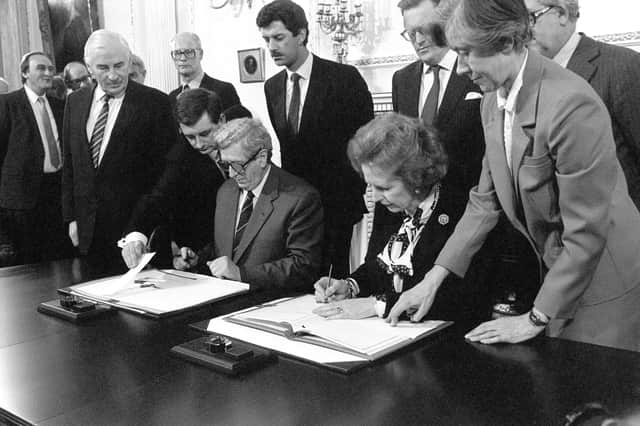Here are some reasons why Britain always trembles if ever Ireland gets upset


(Alex Kane’s article can be read here can be read here and Ben Lowry’s article can be read here)
Alex asks why British governments repeatedly buy off Irish nationalists at the expense of unionists, despite the constitutional framework which they have a duty to uphold.
Advertisement
Hide AdAdvertisement
Hide AdThe history of our past 60 years suggests some of the answers.


1. The UK has wider international interests: unionists are fewer than 1 in 70 of its population. Its economy, security and influence all depend on the quality of its relationships with the US and the EU.
There is an influential Irish-American lobby eager to support the Irish whenever they fall out with the British, and the EU has weaponised the Belfast Agreement to get concessions over Brexit.
2. The Labour Party has always included a faction which favours a united Ireland. As far back as 1963, Prime Minister Harold Wilson wanted the unionists out of Westminster because they voted with the Conservatives; and there was a strong Irish contingent in his Liverpool constituency. Since the 1970s, Labour’s official policy has swung both ways: before he became leader, Jeremy Corbyn openly supported Sinn Fein/IRA.
Advertisement
Hide AdAdvertisement
Hide Ad3. Unionists have fondly imagined that they would get a fairer hearing from the Conservatives, but this has always been an illusion.
Ted Heath cast them out of what had been the Conservative and Unionist Party, encouraged the emergence of the faction which became Alliance, and killed off their devolved administration.
Why? He seems genuinely to have believed that he could end the Troubles by introducing power-sharing with an Irish dimension: the two extremes represented by the DUP and IRA would fade into insignificance, and politics would evolve towards a civilised model of debate over social and economic issues.
Maggie Thatcher signed the 1985 Anglo-Irish Agreement behind their backs, in the belief that Dublin would reciprocate with a package of security measures.
Advertisement
Hide AdAdvertisement
Hide Ad4. This brings us to our fourth reason: Whitehall departments. Senior mandarins persuaded Thatcher to sign the 1985 Agreement.
From as far back as 1971, three major departments have presented arguments in favour of a united Ireland.
The Treasury has wanted to claw back its annual subsidy, now amounting to over £9 billion; the Foreign Office to protect Britain’s relationships with the US, EU and Ireland; Defence to free up the Army for ‘proper soldiering’.
From a unionist perspective, there is no reason to suppose that any of these factors will improve over the foreseeable future.
Advertisement
Hide AdAdvertisement
Hide AdAlex concludes his article by asking, ‘What does unionism do in the absence of friends it should be able to trust?’. All I can suggest is that it would do no harm to make new friends, and perhaps make common cause with amenable former enemies.
WB Smith (Dr), Belfast BT15
——— ———
A message from the Editor:
Thank you for reading this story on our website. While I have your attention, I also have an important request to make of you.
With the coronavirus lockdown having a major impact on many of our advertisers — and consequently the revenue we receive — we are more reliant than ever on you taking out a digital subscription.
Subscribe to newsletter.co.uk and enjoy unlimited access to the best Northern Ireland and UK news and information online and on our app. With a digital subscription, you can read more than 5 articles, see fewer ads, enjoy faster load times, and get access to exclusive newsletters and content. Visit https://www.newsletter.co.uk/subscriptions now to sign up.
Advertisement
Hide AdAdvertisement
Hide AdOur journalism costs money and we rely on advertising, print and digital revenues to help to support them. By supporting us, we are able to support you in providing trusted, fact-checked content for this website.
Alistair Bushe
Editor